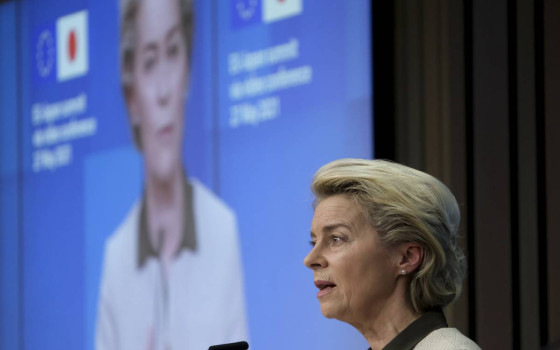
The European Union launches a strategic dialogue on the future of agriculture. Challenges are escalating: competition from abroad, excessive regulation at home, climate change, loss of biodiversity, and demographic decline.

- Europe and Arabs
- Thursday , 25 January 2024 17:12 PM GMT
Brussels: Europe and the Arabs
Ursula Wanderlein, President of the European Commission, said this in her speech on Thursday on the occasion of the official launch of the Strategic Dialogue on the Future of Agriculture. “I raised this idea in my State of the Union address last summer. I think we all feel that there is increasing division and polarization when it comes to agriculture-related topics. I am a firm believer that we can only overcome this polarization that we all feel through dialogue. That is why That's why we want to bring together around this table a diverse group of players in the agri-food sector in Europe. I am happy to see representatives of our farmers, farm workers and rural communities, who are the guardians of our best traditions and who bring life to our countryside. We also have representatives of the food industries. We have Members of consumer and environmental groups, because the whole community cares about the countryside and our food, but also the financial sector and academia are here. In fact, it's a very diverse group, and all stakeholders in the same field will be sending us their ideas and suggestions in the coming days and weeks. And we want to listen. We ask you to discuss and develop scenarios for the future. Basically, it is about describing the way forward. I would like first and foremost to thank all of you for devoting your valuable time with us and for also sharing your experiences and knowledge with us, and we hope that you will share with us your ideas for the future.
Yesterday evening, I really liked our start at casual dinner. And what I took away from the informal dinner last evening is that we all have the same sense of urgency - that things have to get better - and that we have to find a new way forward, common and lasting solutions to the problems you all face. It will be discussed under the leadership of Professor Ströschneider. Thank you very much for accepting this challenge and your mission is of critical importance. Thanks to European agriculture - the women and men who work the land - Europe has the healthiest and highest quality food in the world. Our farmers work every day in a highly competitive global market. You are often the most vulnerable part of the value chain. Of course, you deserve a fair reward. Our goal is to support your livelihoods and ensure European food security. Each of you has a role to play, each from your own perspective of course. Consumers will have a role to play, as their choices drive innovation and demand. For example, parents look for healthy food for their children. They chose very carefully. Young people are increasingly demanding more sustainable food. Retailers and food manufacturers are equally important. You have to compete globally and you have to act locally. You are responding to consumer preferences. Many of you advocate for animal welfare and biodiversity. Many of you are advocating for the interests of the less well-off, for example by fighting food waste. I listened to you very carefully yesterday.
It is thanks to all of you, everyone in their place, that we have to overcome the difficult questions that lie ahead, but also thanks to all of you, everyone, that we have already overcome so much. hard times. If we think again about the pandemic, or the energy crisis or the food crisis, both caused by Russian aggression against Ukraine. We also suffered from high inflation, and agricultural and food inputs were affected. So we had really hard times to overcome together. It is surprising to see Europe's agri-food sector showing remarkable resilience in the face of all this.
In addition, we are all making tremendous efforts to contribute to our collective goals of the European Green Deal. It is existential. Because we all live with nature and from nature. And while we certainly may not always agree on all issues, we all agree that challenges are undoubtedly mounting – whether it's competition from abroad, over-regulation at home, climate change, biodiversity loss or demographic decline. . This is just to name a few of the challenges we discussed yesterday as well. What Europe's agri-food sector needs is a long-term perspective on these challenges, and a predictable way forward. And to move forward on this path, this is your mission. The mission of the 27 individuals here in this room.
I hope you will build confidence to value each other's views and find common solutions for the future of agriculture in Europe.












No Comments Found